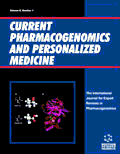- Home
- A-Z Publications
- Current Pharmacogenomics and Personalized Medicine (Formerly Current Pharmacogenomics)
- Previous Issues
- Volume 16, Issue 2, 2018
Current Pharmacogenomics and Personalized Medicine (Formerly Current Pharmacogenomics) - Volume 16, Issue 2, 2018
Volume 16, Issue 2, 2018
-
-
Effects of Propolis and Caffeic Acid Phenethyl Ester (CAPE) on Breast Cancer Cells
More LessAuthors: M.A.E. Watanabe and J.M. SforcinBackground: Propolis, a honeybee product with plenty of biological properties, has displayed a major role in drug discovery because of tumor cells resistance to chemotherapeutic agents and due to limitations of some drugs. Caffeic Acid Phenethyl Ester (CAPE) derived from propolis also possesses a variety of pharmacological properties including anticancer activity. Breast cancer, the most frequently diagnosed neoplasia Read More
-
-
-
Non-B DNA Structures as Candidate Drug Targets Against Structural Chromosomal Instability
More LessBy Nevim AygunBackground: Enzymes, proteins, receptors, ion channels and DNA/RNA are among drug targets. DNA-interactive drugs involve alkylation (temozolomide, chlorambucil and cyclophosphamide), intercalation (doxorubicin), DNA breakage (nitroimidazoles), oxidative degradation (bleomycin), code-reading (polyamides and triplex-forming molecules) and stabilization of topoisomerase-DNA complexes (doxorubicin, Read More
-
-
-
Current Clinical Application and Response Prediction Biomarkers of PARP Inhibitors
More LessAuthors: Wei-Hua Shao, Lei-Yun Wang and Ji-Ye YinRecently, novel drugs that inhibit the enzyme poly (ADP-ribose) polymerase (PARP) based on the concept of synthetic lethality are used for cancer treatment. Three PARP inhibitors (olaparib, rucaparib and niraparib) are approved for the treatment of recurrent ovarian cancer in the US or Europe, while another two (veliparib and talazoparib) showed promising anti-cancer activity. This review aims to summarize the current Read More
-
-
-
Enhanced Sensitivity of Lymphoid Cells to Ethanol ADH Acetaldehyde Toxicity; Implications for GDEPT and Adoptive T Cell Therapy
More LessAuthors: Philip Savage, Claire Horlock, Bryony Stott and Justin StebbingBackground: The ability to kill lymphoid cells with a non-toxic prodrug/gene/ toxin system would be of value in the treatment of lymphoid malignancies and in the regulation of T cells used in adoptive immunotherapy. Objective: In this in vitro study we examined the ability of a novel prodrug/gene/toxin system to produce cytotoxicity in lymphoid cells. The system uses a non-toxic prodrug ethanol, human alcohol dehyd Read More
-
-
-
Regulation of LDLR, Bcl-2 and FASN Expressions by Oxidized Low Density Lipoprotein in Estrogen Receptor Positive Breast Cancer Cells
More LessAuthors: Auni A. Hamid, Siti A. Ahmed and Shahrul HamidBackground: One of the extensively studied antineoplastic agent is Thymoquinone (TQ). Recent studies show increased level of oxidized low density lipoprotein (oxLDL) among cancer patients. However, how oxLDL is involved in cancer cell survival and growth is poorly understood. The goals of this study were to determine the molecular effects of oxLDL on breast cancer cell (MCF7) growth and how they are modulated by thymo Read More
-
-
-
Evaluation of Estrogen Receptor α and Genes Expression in Normal and Neoplastic Mammary Gland in Dogs by Real-time PCR
More LessAuthors: M.R. Nassiri, S.A. Hosseini, S. Ghovvati and M. ZabetianBackground: Estrogen and progesterone play a key role in mammary tumorigenesis of female dogs. Malignant tumors are considered hormone-dependent neoplasms, which may reappear after surgical removal or might spread to other organs such as liver, lymph nodes, and lungs. Objective: The purpose of this study was to evaluate the expression of estrogen receptor α and genes in normal and neoplastic mamma Read More
-
-
-
A Prospective Observational Pilot Study of Adverse Drug Reactions in Patients Admitted in the Geriatric Ward of a Tertiary Hospital in North India
More LessAuthors: Upinder Kaur, Sankha S. Chakrabarti, Bhanupriya Singh and Indrajeet Singh GambhirBackground: Adverse Drug Reactions (ADRs) form one of the leading causes of morbidity and mortality particularly in the elderly population. Alterations in pharmacokinetics and pharmacodynamics with ageing results in increased ADRs which may be novel in respect to the young and may also vary from one older individual to another. These may hence be invaluable in personalized medicine. Objective: The primary objectiv Read More
-
-
-
Individualized Cancer Therapy, Future Approaches
More LessAuthors: Da-Yong Lu, Ting-Ren Lu, Bin Xu, Jin-Yu Che, Ying Shen and Nagendra S. YarlaBackground: Cancer is a series of different disease (>200 different sub-types) with an identical feature of unlimited growth, invasive and multi-step/multi-level metastasis processes. Objective: Individualized cancer therapies/personalized cancer therapies will undergo a dramatic evolution to cope with this disease diversity and a complexity of tumor genes/biomarkers. Methods: The next generation of personalized cancer ther Read More
-
Volumes & issues
Most Read This Month
Article
content/journals/cppm
Journal
10
5
false
en


